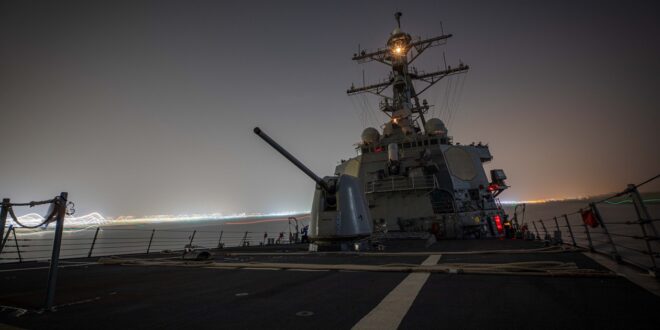Senior Biden administration officials agree that striking Houthis in Yemen is the wrong course of action for now, per three U.S. officials, even though some military officers have proposed more forceful responses to the militants’ attacks in the Red Sea.
There’s high-level consensus within the administration that it does not make sense for the U.S. military to respond directly to the Houthis, the officials said. Although the missile and drone attacks on three civilian vessels on Sunday drew a U.S. Navy warship into an hours-long firefight, U.S. intelligence officials have not determined that the warship was the target.
Separately on Wednesday morning, the destroyer USS Mason shot down another Houthi-launched drone in the Red Sea, according to a U.S. military official. There was no damage or injury to U.S. equipment or personnel.
Military officers charged with U.S. operations in the Middle East have drafted options to hit back against the militants, though they are not actively pushing them at this time, according to one of the officials and a fourth American official.
The military’s job is to present a variety of options to senior commanders, but the ultimate decision is up to the president and the administration’s political appointees. In multiple high-level meetings this week, the Pentagon has neither briefed President Joe Biden on options to strike Houthi targets nor recommended that he do so, two of the officials said. All were granted anonymity to detail sensitive internal deliberations.
Some current and former military officials were frustrated by the administration’s initial response to the Houthis’ Sunday attacks on the ships. The Houthis launched four drone and missile attacks on three ships; the destroyer USS Carney, responding to the distress calls, shot down three drones in its vicinity. Those current and former officials say the Iran-backed group’s increasingly aggressive behavior poses a significant risk to American forces in the region, and took issue with the administration’s public statements on Monday, which they say downplayed that threat.
But while top Biden administration officials acknowledge the threat to U.S. troops, they are not convinced the U.S. needs to respond militarily. They believe the Houthis were attempting to target assets with ties to Israel — either owned by Israeli companies or crewed by Israelis — not U.S. warships. But Houthi missiles aren’t overly precise.
And as the White House and senior Pentagon leaders seek to contain the violence in Israel and Gaza, they are concerned that Iran, which backs the Houthis in Yemen, Hamas in Gaza and Hezbollah in Lebanon, could escalate the conflict.
Senior officials across the government are also worried that a major strike on Houthi positions could derail progress on another Middle East conflict: U.S. and U.N.-led efforts to broker another cease-fire between Saudi forces and the militants in Yemen, according to a fifth U.S. official and a lawmaker.
The U.S. envoy for Yemen, Tim Lenderking, is in the Middle East to protect global shipping and “end the Yemen conflict,” per a State Department release. Talks between the Saudis and Houthis have been ongoing for months, with many sticking points to be hammered out, including the exit of foreign troops from Yemen.
“In light of the recent targeting of civilians by the Houthis and its piracy in international waters, we have begun a review of potential sanctions,” said a State Department spokesperson. “We will be considering other options together with our allies and partners, as well.”
Saudi Arabia, a key U.S. partner in the region that recently resumed ties with Israel, is also urging the U.S. to show restraint, according to reports.
“What we don’t want to see is the conflict in Israel widen to a regional war. As of today, it has not,” said Pentagon spokesperson Sabrina Singh on Monday.
On Tuesday, Pentagon spokesperson Brig. Gen. Patrick Ryder declined to discuss specific future strikes. However, he noted that the U.S. was discussing setting up an international maritime task force to counter the Houthi attacks, within the framework of the existing Combined Maritime Forces, a 38-nation partnership based in Bahrain focused on combating terrorism and piracy.
“We are definitely looking to take action as it relates to working with partners and allies throughout the region. Oh, by the way, it’s something that we’ve been doing for years,” Ryder said.
Still, some officials at Central Command, which is responsible for U.S. military forces across the Middle East, have discussed options to strike Houthi-held positions in Yemen that launched the attacks in the Red Sea, according to the fourth U.S. official and one of the former DOD officials.
Officials are also concerned that DOD has not done enough to respond to Iran-backed groups’ continued attacks on U.S. ground forces in Iraq and Syria, said another person outside the government who was briefed on the discussions.
“Current actions aren’t resetting deterrence,” the person said. There’s a “strong belief that Iran needs to be ‘shocked’ out of this cycle.”
Biden administration officials have been worried about lighting a powder keg in the Middle East since the Hamas terrorist attacks against Israel on Oct. 7. The officials have worked furiously to contain the Israel-Gaza conflict within the enclave’s borders and insist that they have succeeded.
Within DOD, however, many believe the conflict has already escalated — and U.S. on land and at sea in the Middle East — are increasingly at risk.
“It’s time for us to start shooting back,” said retired Vice Adm. John Miller, a former commander of naval forces in the Middle East.
 Eurasia Press & News
Eurasia Press & News


